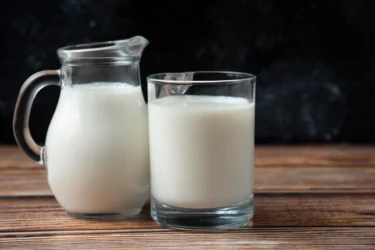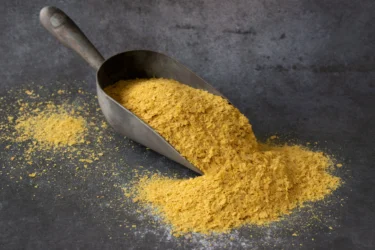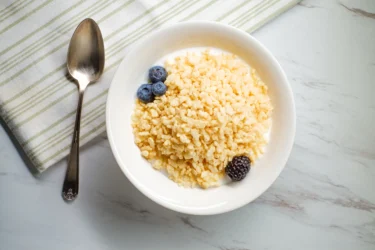Have you been feeling unusually tired, low on energy, mentally unclear or confused? While these symptoms can have many causes, one possibility worth considering is a deficiency in vitamin B12.
Vitamin B12, also known as cobalamin, is an essential nutrient involved in red blood cell production, nerve function, and DNA synthesis. While it is often overlooked, adequate B12 level is essential for maintaining energy levels and supporting cognitive and neurological health of the body.
Your body cannot produce B12 on its own, so it must be obtained through foods high in vitamin B12 or supplements. Animal-based foods such as meat, dairy, and eggs are the primary sources of vitamin B12. Thus, if you follow a vegetarian or vegan diet, you may need B12 supplements to meet your daily requirement for the vitamin1,2.
In this article, we will explore vitamin B12 rich foods to help you maintain optimal vitamin B12 level and support your overall health, in a way that is both enjoyable and practical.
Vitamin B12 (also called cobalamin) is a nutrient your body needs to stay healthy2. It plays a key role in:
The recommended dietary allowance (RDA) of vitamin B12, which is sufficient for the nutrient needs of adults, is approximately 2.4 mcg per day2.
Individuals following a vegan or vegetarian diet are at increased risk of having low vitamin B12 levels, as B12 is mostly found in animal foods.
People with health conditions that interfere with vitamin B12 absorption also may be at risk of deficiency, even if they consume enough through food. Since vitamin B12 absorption is a complex, multi-step process, any disruption can affect how much the body absorbs.
You are more likely to have low B12 if you3:
Good to know: Unlike foods high in vitamin B12, B12 from supplements or fortified foods (like some cereals or plant-based milks) does not need to go through all these steps. It is already in a form your body can absorb more easily. Therefore, these alternate options could be helpful for people who have trouble absorbing B12 from food.
Signs of a vitamin B12 deficiency can appear slowly and may include3:
If these sound familiar, talk to your doctor about testing for vitamin B12 levels.
Vitamin B12 plays a key role in keeping your energy levels up, your nerves healthy, and your blood cells functioning properly2. Since your body cannot make it on its own, getting enough from foods high in vitamin B12 (or supplements) is essential.
Most vitamin B12 comes from animal-based foods, but there are some excellent fortified plant-based options for vegetarians and vegans2,3. Let’s explore some of the top vitamin B12 rich foods to help you meet your daily needs and stay energised and healthy:

Milk is an easy and reliable source of B12. It also gives you calcium and vitamin D, which help build strong bones and support your immune system1.
Tip: For vegans, fortified plant-based options like soy milk can offer up to 45% of your B12 RDA. Check the label to be sure.

Yoghurt is not just good for your gut; it is a solid B12 source1.
Tip: Choose low-fat, unsweetened yoghurt to avoid added sugar while still getting protein, calcium, and gut-friendly probiotics.

Cheese adds flavour and nutrients to your meals2.
Note: Cheese is nutritious but also high in saturated fat; therefore, enjoy it in moderation.

Eggs are packed with high-quality protein, healthy fats, and B vitamins1.
Tip: Include eggs a few times a week as a simple, nutrient-rich choice.

Fish is one of the richest natural sources of vitamin B12. It also provides omega-3 fats for heart and brain health1.
Here is how much B12 you get from these portions:
Bonus: A serving of salmon also gives you around 40g of protein, which is great for muscle health.

Poultry is a lean and healthy protein source that also provides B121.
Bonus: It is great for those who prefer lean meats.

Shellfish are B12 superfoods as they provide high levels of vitamin B122.
Bonus: Even small portions of these superfoods provide way more than your daily need and they are also rich in zinc and iron!

A favourite among vegans, nutritional yeast has a cheesy flavour and is often fortified with B121.
Bonus: Great served on popcorn, in soups, or stirred into sauces. Always check the label to make sure it is fortified.

Fortified cereals have vitamin B12 added during processing, making them easy to absorb for vegetarians and vegans1.
Tip: Pair with fortified plant milk for a double B12 boost. Check the nutrition label for specifics.

Beef is a powerful source of B12, especially organ meats like liver2.
Caution: Although liver is a great vitamin-rich option for those who eat it, make sure you cook it in healthy oils.
Most people can get enough vitamin B12 from vitamin B12 food sources, especially if they eat animal-based foods like meat, dairy, or eggs. But for some groups, it can be harder to absorb or get enough from food alone. In these cases, a vitamin B12 supplement can be very helpful, and sometimes even necessary.
Here are some groups who may benefit from B12 supplementation3:
Since B12 is found mainly in animal products, people on plant-based diets may not get enough from food alone. A daily B12 supplement or fortified foods can help fill the gap.
As we age, our stomach produces less acid, which can affect how well we absorb B12 from food. Many older adults benefit from B12 in supplement form, which is easier to absorb.
Conditions like Crohn’s disease, celiac disease, or those who have had intestinal or stomach surgery (including weight-loss surgery) can make it harder to absorb B12 properly. Supplements, sometimes in higher doses or by injection, may be needed for these individuals.
This is an autoimmune condition that prevents the body from absorbing B12 naturally. If you have this, your doctor may recommend regular B12 shots or high-dose supplements to keep your levels up.
GI tract surgery, such as a gastric bypass, can reduce your body’s ability to absorb vitamin B12, increasing the risk of deficiency.
Medications like metformin or acid blockers can impair the body’s ability to absorb B12 properly, therefore, individuals who take such medicines may need vitamin B12 supplementation.
Symptoms like fatigue, memory issues, dizziness, numbness or tingling in the hands and feet, and pale skin can indicate a vitamin B12 deficiency. If you have these symptoms, you should visit a doctor.
Your doctor will ask about your symptoms and may also check your reflexes, balance, and sensation since B12 affects the nerves. To confirm whether you are deficient, your doctor will order some blood tests. These help catch problems early, guide treatment, and prevent serious complications like anaemia and nerve damage.
Also Read: How To Increase Platelet Count Naturally
Also Read: 11 Healthy Foods That Can Help You to Gain Weight
Sometimes, if the cause of B12 deficiency is unclear, your doctor might recommend further testing:
Testing and treating vitamin B12 deficiency is simple, but crucial. Left untreated, low B12 levels can lead to permanent nerve damage, anaemia, and memory issues. If you are experiencing symptoms or are in a higher-risk group (like older adults, vegans, or people with gut issues) it is important to get checked.
Also Read: 10 Iron Rich Foods to Add to Your Diet
Making sure you get enough vitamin B12 from vitamin B12 food sources is an important part of staying healthy. This is because it supports your energy levels, nervous system, and red blood cell production.
Vitamin B12 deficiency often develops slowly, and sometimes the symptoms can be easily overlooked, like fatigue, brain fog, or tingling in the hands and feet. For most people, eating a well-balanced diet that includes animal-based foods like dairy, eggs, fish, or meat is enough to maintain healthy B12 levels. However, if you are vegetarian, vegan, over the age of 50 years, or have a digestive condition that affects nutrient absorption, a quick blood test can give you peace of mind and help you stay ahead of any health issues.
Taking small steps now, like including vitamin B12-rich foods in your diet, can make a significant difference in your long-term energy, memory, and well-being.
Since vitamin B12 is found naturally in animal-based foods (like meat, fish, dairy, and eggs), vegetarians and especially vegans may struggle to get enough from food alone. However, there are some great alternatives, such as fortified foods (like cereals, nutritional yeast, and plant-based milks). Vegans, in particular, should consider taking B12 supplements after consulting with a doctor to ensure they are getting enough to maintain healthy levels.
The recommended dietary allowance (RDA) for adults is about 2.4 micrograms (mcg) per day. However, this can vary slightly based on age, pregnancy, and health conditions. If you are unsure about your specific needs, it is always best to consult with a healthcare provider.
A vitamin B12 deficiency can lead to a variety of symptoms, including fatigue, weakness, memory problems, and nerve damage. Over time, not getting enough B12 can lead to anaemia (low red blood cells), and in more serious cases, it can cause neurological problems like difficulty walking, numbness, or even memory loss. It is essential to get enough B12 either from your diet or supplements (if recommended) to avoid these issues.
Vitamin B12 is a water-soluble vitamin, which means that any extra amount your body does not need is usually excreted in urine. Because of this, it is generally considered safe to take more than the recommended daily amount. However, high doses of B12, especially through supplements, should be discussed with your doctor, particularly if you have any underlying health conditions.
Yes, cooking can affect the vitamin B12 content in food. High temperatures and prolonged cooking times can break down some of the B12 in foods. To minimise loss, try using gentler cooking methods like steaming or poaching instead of frying or grilling at very high temperatures.
Physician’s comment:
“While cooking can reduce the B12 content in foods, it is usually not enough to cause a deficiency on its own (unless your diet already lacks B12-rich foods). If you are worried about this, focusing on a variety of vitamin B12 sources, including fortified foods and supplements, if necessary, will help ensure adequate intake.”
Disclaimer: The information provided here is for educational/awareness purposes only and is not intended to be a substitute for medical treatment by a healthcare professional and should not be relied upon to diagnose or treat any medical condition. The reader should consult a registered medical practitioner to determine the appropriateness of the information and before consuming any medication. PharmEasy does not provide any guarantee or warranty (express or implied) regarding the accuracy, adequacy, completeness, legality, reliability or usefulness of the information; and disclaims any liability arising thereof.